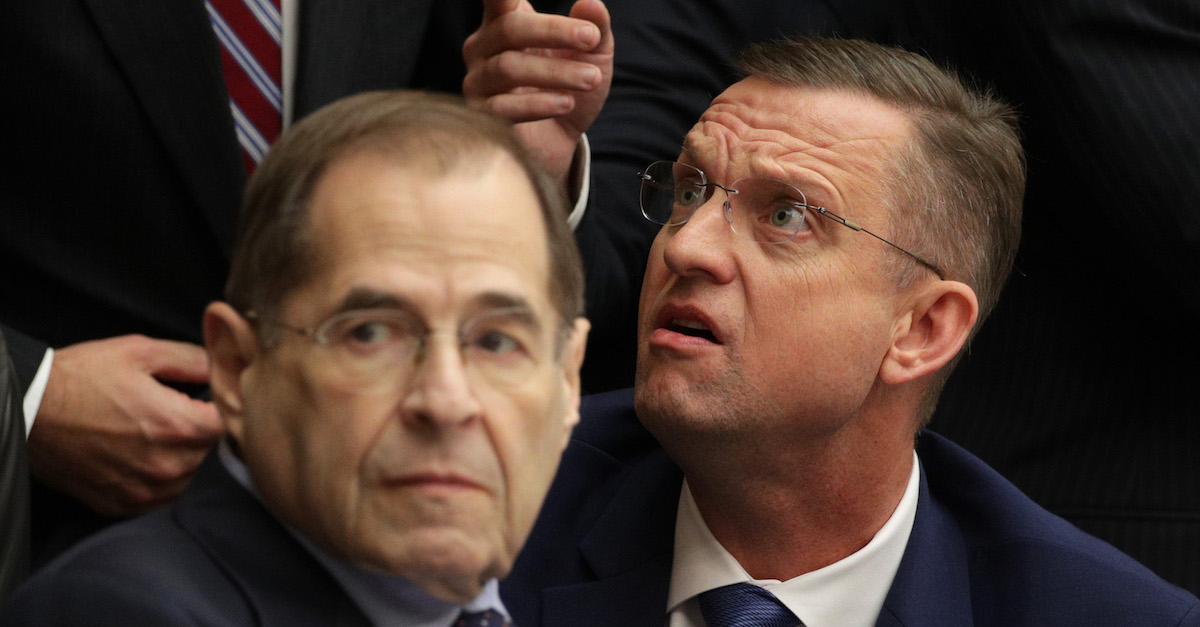
Last week, House Judiciary Committee Chair Jerrold Nadler (D-N.Y.) indicated that the Committee is filing a petition to obtain the underlying grand jury material relative to the Mueller report. According to Nadler, in their petition to obtain the grand jury documents, the Committee is considering “whether to exercise its full Article I powers, including a constitutional duty, power of the utmost gravity, a recommendation of articles of impeachment.” The petition also asserts that “articles of impeachment are under consideration as part of the Committee’s investigation, although no final determination has been made.”
Nadler’s comments come on the heels of Robert Mueller’s recent testimony, which failed to produce any soundbites and/or new information that could hurt the president or support the Democrats’ push for impeachment. To the contrary, Mueller appeared weak, feeble, unsure of himself, uncomfortable with what was in the report, unable to remember important and relevant information pertinent to the report, and evasive. Mueller also had difficulty with many of the questions that were posed to him, as reported by Politico.
When Attorney General William Barr initially released the redacted version of Mueller’s report, congressional Democrats immediately threatened to subpoena the full report and the underlying evidence, although the decision about what information to redact was ultimately up to Barr pursuant to the relevant regulation and so long as release of the report complied with applicable legal restrictions.
One such restriction involves the release of grand jury information. Specifically, Federal Rule of Criminal Procedure 6(e) prohibits the public release of documents and testimony presented to the grand jury. Generally, grand jury information is not disclosed — to protect the secrecy of the grand jury proceedings, prevent those who are being investigated from leaving the area (fleeing), ensuring full cooperation from witnesses and protecting those who are innocent from unnecessary and unjustified prosecution.
There are exceptions to this general rule. According to a 2019 report prepared by the Congressional Research Service, while grand jury information is normally secretive in nature, one exception allows a court to authorize disclosure of grand jury matters “preliminarily to or in connection with a judicial proceeding.” Some courts have found that this exception is triggered when Congress requests grand jury materials in the context of impeachment proceedings.
Although the House has not formally pursued articles of impeachment against the president, some courts have held that a House investigation preliminary to impeachment falls within this exception. In other words, while the Committee’s preliminary investigation is not a “judicial proceeding” like an impeachment trial in the Senate would be, it is still preliminary to a “judicial proceeding.”
Of course, to obtain the material, the House would need to establish a “particularized need” for the material and show that the need outweighed the public interest in secrecy. Impeachment has met this standard according to some courts.
During Watergate, a D.C. Circuit ruling appeared to bless the release of grand jury material sought by Congress in connection with a potential impeachment of President Richard Nixon. The District Court judge overseeing the jury said the impeachment process amounted to the kind of judicial proceeding in which such releases were authorized.
Despite the foregoing, there are still several compelling arguments against disclosure. With regard to President Trump, Democrats have failed to obtain any legitimate evidence of high crimes or misdemeanors despite spending endless money on a 2-year investigation, interviewing multiple witnesses, issuing many subpoenas and questioning Robert Mueller for hours about the results of the investigation. Therefore, it is not unreasonable to argue that there is no logical reason and/or basis to release grand jury information given that the wide/vast investigation failed to yield any evidence of wrongdoing and/or impeachable conduct by the president.
Furthermore, despite the vast investigation, the subpoenas and interviews and Mueller’s recent testimony, Democrats have not passed articles of impeachment, likely because there is insufficient evidence and because such a move would be damaging from a political perspective. Therefore, they are asking a judge to release grand jury information without any basis whatsoever and simply for purpose of an “impeachment inquiry.” The danger associated with such a request is significant:
If a judge rubber stamps this, it opens the door for massive abuse, not just that which will take place under Nadler, but also in future administrations. Don’t like who was elected president? Just open an impeachment “inquiry” in a committee and demand all their personal information. There’s got to be something there, right? And we just need to be sure of course.
Additionally, some Republicans on the Committee argued that the House had not entered a formal impeachment inquiry and that disclosure of grand jury materials was not warranted. For example, House Judiciary Committee Ranking Member Doug Collins (R-Ga.), blasted Nadler’s move to “sue for grand jury material to which they have no right”:
Chairman Nadler’s legal action here is sure to fail, weakening Congress’s ability to conduct oversight now and into the future. If my colleagues want grand jury information, they should propose legislation allowing Congress to access it. Democrats want to convince their base they’re still wedded to impeachment even after this week’s hearing, but a baseless legal claim is an odd way to show that.
At some point in the future, the nation’s highest court may be asked to address and/or clarify this issue.
Mr. Hakim is a political writer and commentator and an attorney. His articles have been published in The Washington Examiner, The Daily Caller, The Federalist, The Algemeiner, The Western Journal, American Thinker and other online publications. Twitter: @ThoughtfulGOP.
[Image via Alex Wong/Getty Images]
This is an opinion piece. The views expressed in this article are those of just the author.